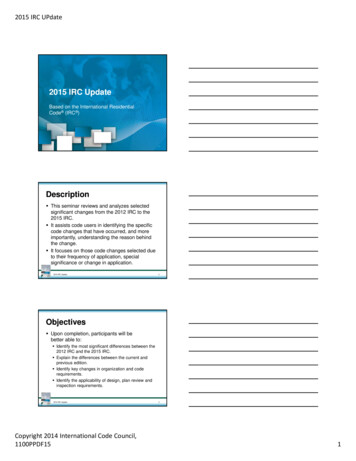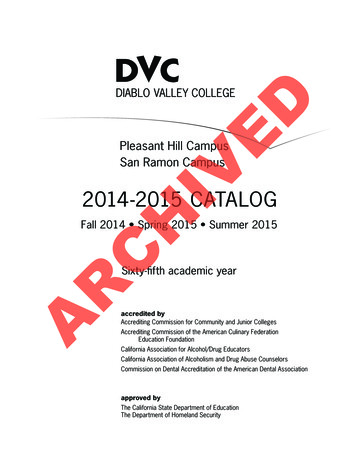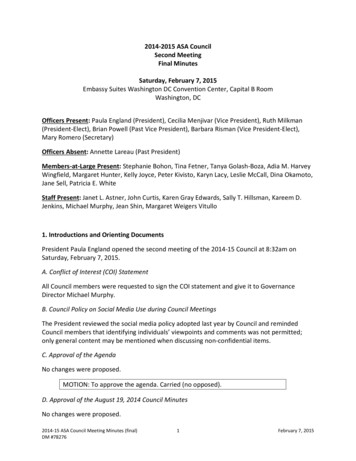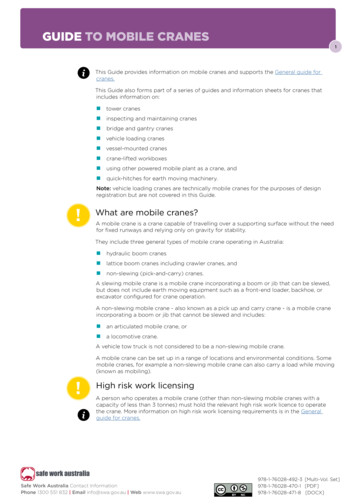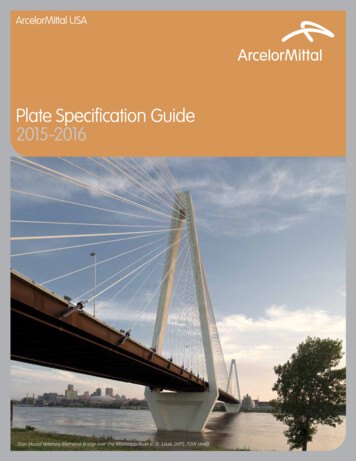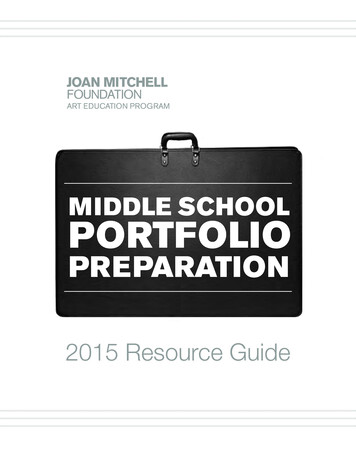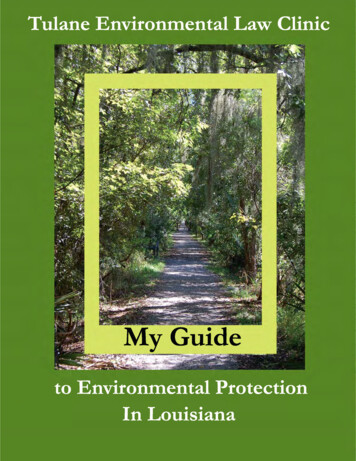
Transcription
My Guide to Environmental Protection in LouisianaDecember 2015Copyright 2015 Tulane Environmental Law ClinicTulane Environmental Law Clinic6329 Freret StreetNew Orleans, Louisiana 70118www.tulane.edu/ telc/Phone: 1 504 865 5787i
Please note:This Guide is for informational purposes only and is not advertising, a solicitation, or legaladvice. It is not a substitute for legal advice. Transmission or receipt of the materials andinformation in this Guide do not create an attorney-client relationship.ii
FORWARDWhen making decisions that may harm the environment, Louisiana law requires thegovernment to balance environmental and economic issues. Common sense tells us, however, thatthe government will often give the most weight to the concerns it hears the most about. So toprotect environmental resources in your community, it is important to make your voice heard.By and large, industries that pollute the environment are organized. They know how tomake government officials hear their voices. They know where to find the law, where to findexperts, when to file comments, how to hire lawyers, etc. They therefore have an advantage ingetting what they want from government, which may not always be the same thing that you want.How do you make sure that government hears your voice too? That is what the TulaneEnvironmental Law Clinic prepared this guide to help with. There is no magic bullet of course.Organizing, commenting effectively, building coalitions, and other things you need to do toinfluence government decisions takes hard work, trial and error. Plus, one thing we’ve learned atthe Clinic is that no matter how hard you work, you don’t always win. You don’t even always winthe really important battles. But you can win some of the time. And whether we win or lose, wefind it helps to know that we did our best to get our points across.It is natural to feel angry or bitter sometimes about destructive government actions orindustry proposals and projects. But those emotions can interfere with our ability to communicateeffectively and to win the next battle. Some of our opponents on today’s issue may be allies on adifferent issue tomorrow. It is therefore best not to burn bridges. It is important, of course, tocommunicate your passion and focus. But at the Clinic, we have found that approaching opponentsand government officials with respect can also increase chances of success. We are in this battlefor the long haul and good relationships with people on all sides of the issues help make a longterm commitment to public activism sustainable.The Clinic owes a debt to many who helped draft and improve the guide that follows. Tomention a few: our Community Outreach Director, May Nguyen, did the bulk of the editing, rewriting, and preparation of new material for this edition. She had a lot of help, however. We thankthe following members of the Clinic’s Community Outreach Advisory Committee for their wisecounsel: Monique Harden, Cyndi Nguyen, Marylee Orr, Jennifer Roberts, Cheryl Slavant,Burghart Turner and Dean Wilson. Thanks also to designers Cheri Babich and Kelsey Nibert.Special thanks to the Clinic’s hardworking undergraduate student interns: Jeremy Apolinski, ErinPlatt, and Andrew Vaughan. As always, we thank the McKnight Foundation and the Deer CreekFoundation for years of crucial support.We hope that you find this guide useful. Please let us know if you have suggestions forimprovements to future editions.Please note that the Clinic has prepared “Citizen’s Guide” videos that cover much of thesame ground as this guide. Those videos are available on YouTube and at the following internetaddress: http://www.tulane.edu/ telc/html/CG Vids.html. As we repeat at the end of each of thesevideos: This is your Louisiana, your environment!Adam Babich,Director, Tulane Environmental Law Cliniciii
TABLE OF CONTENTSPart I. Finding Out What’s Going OnChapter 1. Request Public Notice .2Chapter 2. Access Government Information .9Part II. Taking ActionChapter 3. Report the Problem .21Chapter 4. Public Comment .27Chapter 5. Policy Advocacy.34Chapter 6. Litigation .42Part III. Building Public ParticipationChapter 7. Organizing .50Chapter 8. Communications & Media .58Part IV. What’s the Law?Chapter 9. How to Find the Law .63Chapter 10. Commonly Referenced Environmental Laws .68LagniappeList of Louisiana Environmental Agencies .80List of Federal Environmental Agencies.87List of Louisiana Libraries .96iv
Part IFIND OUT WHAT’S GOING ON1
This Chapter can help youexercise your rights to get noticeabout:1. Permit Applications2. Proposed Rules (alsoknown as regulations)3. Public CommentPeriods4. Public Hearings5. Public MeetingsChapter 1REQUEST PUBLIC NOTICEAre you interested in finding out what’s going on in yourenvironment? The first step is to pay attention to decisions andproposed decisions of federal, state and local agencies. Watchfor any permit applications or proposed regulations that couldaffect your environment. As a member of the public, you usuallyhave a right to receive notice (that is, announcements) whengovernment agencies use their power to create rules or issuepermits to polluters.Monitoring these notices is important. The law may onlyprovide a short period (for example, 30 days) after an agencypublishes a notice for public comment. Prompt notice allows youmore time to review the permit application or proposed rule.Failure to comment within the comment period usually meansthat 1) the agency will not pay attention to your comments, and2) you may not appeal the government’s decision to a court.Government ActionMany government agencies have permitting programs.Polluters usually must have a permit in order to pollute theenvironment without breaking the law. To get a permit, thepolluter must submit a permit application to the governmentagency. Some government agencies publish or distribute a noticethat they have received a permit application. In addition,government agencies often provide notice of proposed permitdecisions.Government agencies create and amend rules to regulateenvironmental pollution. Usually, the agency will start by draftinga rule or an amendment. Then the agency will publish ordistribute notice about the proposed rule and invite publiccomment.In a notice of an opportunity for public comment, thegovernment typically invites the public to comment on a permitapplication or a proposed rule. For example, Louisiana state2
agencies, such as the Louisiana Department of Environmental Quality (LDEQ) or the LouisianaDepartment of Natural Resources (LDNR) often seek public comment about a permit applicationby publishing public notice of the proposed permit. The notice will include a deadline or set atime limit (for example, 15, 30, or 90 days from the date of notice) for public comment.Here’s an example of a public notice for public comment.1.1 Sample Notice Louisiana Department of Environmental Quality (LDEQ) Notice of PublicComment Period for a Permit Application (Page 1 of Notice)Some notices announce public hearings. In such a notice, the government agency invitesthe public to appear in person to comment on a proposed action – such as a proposed rule orpermit application.3
In addition, sometimes a government official (for example, commissioner or electedofficial) will hold a meeting to discuss government matters.Notice of a public meeting includes information about theSources for Notice:date, time, place and agenda of the public meeting. NewspapersHow to Get Notice FlyersYour method of accessing notice of governmentactions will likely depend on the government agency involvedand on the type of activity at issue in the permit or rule. Government website Government email“listserve” (receiveelectronic copies)The government may publish announcements in Government directnewspapers or flyers about public meetings. Your town, city,mailing list (receiveor parish level government offices may also publishhardcopies)announcements about regular meetings on their website. Forexample, the New Orleans, Baton Rouge and Lafayette Boardof Zoning Adjustment or Planning Commission calendars of meetings and agendas are located atthe following internet addresses: http://www.nola.gov/city-planning/calendar/ m t.aspxThese web addresses may have changed by the time you are reading this. It should be relativelyeasy, however, to find current web addresses.Government websites are, in general, good sources of information. Please refer to the Lagniappesection at the end of this guide for lists of state and federal environmental agencies. Theseagencies have websites that you can search for public notices and other information. Forexample, below are public notice websites for the Louisiana Department of EnvironmentalQuality and the Louisiana Department of Natural Resources—two important state environmentalagencies. The following internet addresses are subject to change, but it should be relatively easyto find current web addresses. Louisiana Department of Environmental /default.asp Louisiana Department of Natural Resourceshttp://dnr.louisiana.gov/index.cfm?md pagebuilder&tmp home&pid 5914
If you would like to have public notices sent directly to you, you can request to be addedto a government agency email “listserve.” Some agencies maintain a “listserve” to provide emailnotices to people who subscribe to the list. You can subscribe to the Louisiana Department ofEnvironmental Quality listserve online, currently located at the following internet address: http://louisiana.gov/Services/Email Notifications DEQ PN/The Federal government compiles public notices about many topics in a daily publicationcalled the Federal Register. You can subscribe online to receive an electronic copy of the Federalregister. The sign-up page is currently located at the following internet address: D1 FEDREGTOC-L&A 1Sometimes the Louisiana Department of Environmental Quality will issue a permit without providing public noticeon its listserve or its web page (for example, for so-call “minorsource” air quality permits). At least in theory, however, LDEQwill send notice that it received an application for such apermit to people who made a written request for permitnotices within their parishes (a sample request appears onthe next page).When requesting notice from a federal agency, suchas the U.S. Army Corps of Engineers, it is generally a good ideato direct your letter to the regional office that regulates theactivity. The Corps is divided into regional district offices. TheOrleans District regulates southern Louisiana. The VicksburgDistrict regulates northern Louisiana. Similarly, EPA is dividedinto regional offices. EPA Region 6, located in Dallas, Texas, isprimarily responsible for EPA activities relating to Louisianaand Arkansas, among other states. EPA Region 4, located inAtlanta, Georgia, is primarily responsible for EPA activitiesrelating to Mississippi, among other states.“Getting notice is myfirst line of defense toprotect myenvironment and myfamily. Without thisinformation, I would bein the dark until it istoo late to make adifference”.Dean Wilson,Atchafalaya BasinkeeperIf you have questions about how to receive public notices from an agency, you shouldnot hesitate to contact that agency, which may have a “public affairs” or “public participation”section. Even when citizens are in conflict with agencies such as LDEQ about environmentalpolicies, LDEQ employees—for example, in the “public participation group”—are often friendlyand helpful.On the next page are a couple of sample letters you might use to request some types ofnotice. Note: In the letters below and elsewhere in this guide, “§” is an abbreviation for“Section.” Thus, the reference below to “La. Rev. Stat. § 30:2022(A)(1)” is to Title 30, Section2022(A)(1) of the Louisiana Revised Statutes.5
[Your First and Last Name][Street Address][City, State, Zip Code][Insert Date]Administrator, Office of Environmental ServicesLouisiana Department of Environmental QualityP.O. Box 4313Baton Rouge, Louisiana, 70821-4313RE: Request for public notice pursuant to La. Rev. Stat. § 30:2022(A)(1)Dear Administrator:In accordance with Louisiana Revised Statute § 30:2022(A)(1), I request notice, by mail,of the subject matter of each application for a permit, license, registration, variance, or LPDESvariance that affects the area of [Your Parish Name].Section 30:2022 provides that, within 30 days of receiving an application for a permit,license, registration, variance, or LPDES variance, “the secretary shall promptly send a notice ofthe subject matter of each application to any public interest group or individual within theaffected parish who has requested notice in writing and provided a mailing address.”I am an individual within [Your Parish Name], and my mailing address is:[First and Last Name][Street Address][City, State, Zip Code]My e-mail address is: [Email Address]Thank you.Sincerely,[Your Signature][Name]1.2 Sample Letter Louisiana request for public notice of permit applications received6
[Your First and Last Name][Street Address][City, State, Zip Code][Insert Date]Administrator, Office of Environmental ServicesLouisiana Department of Environmental QualityP.O. Box 4313Baton Rouge, Louisiana, 70821-4313RE: Request for public notice pursuant to La. Admin. Code tit. 33, part I, § 109Dear Administrator:In accordance with La. Admin. Code tit. 33, part I, § 109, I request public notice, bydirect mailing, of any emergency and non-emergency contamination that affects the area of[Your Parish Name].La. Admin. Code tit. 33, Part I, § 109 provides that the regulatory agency provide publicnotice about contamination that may affect nearby communities. Public notice includes directmailings.I am an individual within [Your Parish Name], and my mailing address is:[First and Last Name][Street Address][City, State, Zip Code]My e-mail address is: [Email Address]Thank you.Sincerely,[Your Signature][Name]1.3 Sample Letter Louisiana request for public notice of air contamination7
Request Public NoticeMY NOTES8
This Chapter can help youexercise your right to accesspublic records. It covers: Access to governmentinformation andgovernment meetings How to obtain publicrecords Sample letters torequest public records Issues that may ariseChapter 2ACCESS GOVERNMENT INFORMATIONGenerally, as a member of the public, you have a right toattend government meetings and review information ingovernment possession. As an environmental advocate,attending meetings and reviewing public records can help youensure that government agencies follow the law when makingdecisions that impact the environment.Useful information may include data that agencies use inmaking decisions, such as: Research DataInspections and Inspection ResultsInternal reportingMapsIndustry Reports (for example, reports ofmonitoring results or pollution incidents) Permits and Permit Applications Environmental Assessments Meeting MinutesEnvironmental laws and regulations requires thatagencies and permit holders gather, produce, record, and reportmuch of this information. For example, when companies violatetheir permits or accidentally release toxic chemicals, the lawusually requires those complies to file prompt reports.Companies submit these reports to agencies such as theLouisiana Department of Environmental Quality. Also, the lawoften requires permit holders to monitor and file reports abouttheir discharges to show whether or not they are complying withpermit limits.Local, state and federal government agency conductfrequent meetings. The law requires that many of these meetingbe open to the public. These kinds of laws are generally referredto as “Government in the Sunshine” or “Open Meetings” laws.At the federal level, the Government in the Sunshine Actprovides for public access to some types of governmentmeetings. This law only applies to agencies headed by a body9
composed of two or more individuals, and the majority must be appointed by the President andconfirmed by the U.S. Senate. For example, the U.S. Environmental Protection Agency (EPA) andU.S. Department of Interior (DOI) are exempt because each has a single head—the Administratoror the Secretary, respectively. However, agencies like the Federal Energy Regulatory Commission(FERC) or the Nuclear Regulatory Commission (NRC), which are headed by commissions, aresubject to the Government in the Sunshine Act.Regardless of the type of agency, the Government in the Sunshine Act also limits themeetings available to the public by distinguishing between the topics to be discussed and thepeople in attendance. The bottom line is that if the commission is undertaking official business,it must be open to the public. You can find notices of federal government meetings that are opento the public in the Federal Register. Refer to Chapter 1 to learn about subscribing to the FederalRegister.The Federal Advisory Committee Act (FACA) is another federal law regarding open accessto government meetings. Specifically, FACA provides for public access and public notice in theFederal Register to most meetings of committees thatadvise federal agencies. For these advisory committees,“It is essential to theFACA also requires that the minutes, records, andmaintenance of areports be made publically available.democratic society thatLouisiana provides for public access in theLouisiana Open Meetings Law. That law says: “It ispublic business beessential to the maintenance of a democratic societythat public business be performed in an open and publicperformed in an open andmanner and that the citizens be advised of and aware ofpublic manner ”the performance of public officials and the deliberationsand decisions that go into the making of public policy.”Louisiana Open Meetings LawLa. Rev. Stat. § 42:12. Basically, Louisiana’s OpenLa. Rev. Stat. § 42:12Meetings Law requires that most meetings of aLouisiana governing authority, such as a parish government or school board, be open to thepublic. In general, public bodies must keep written minutes of all of their open meetings. Publicbodies must generally also provide advance notice of regular, special or rescheduled meetings.The notice must include the date, time, and place of the meeting, plus the meeting’s agenda.Note that this does not apply to court proceedings.How to obtain public recordsMost reports filed with the government become public records and are available forreview at the agency office. Generally, if you visit a government agency office, you can ask theperson on duty for the record. Depending on the agency, however, you may need to provide awritten request to review public records (discussed below).10
At the local level, agencies are usually locatedwithin the city hall, town hall, or parish council building. Itmay be a good idea to call in advance and confirm that theagency has the record. For example, in New Orleans, thereis the Mayor’s Office of Coastal andEnvironmental AffairsDepartment of SanitationBoard of Zoning AdjustmentsCity Planning CommissionSewerage and Water BoardHistoric District Landmarks CommissionParks and ParkwaysWays to Obtain PublicRecords: Visit the governmentoffice Search online publicgovernment database Write a letter to requestfederal public records Write a letter to requeststate public recordsAll of these offices are currently located at thesame address:1300 Perdido StreetNew Orleans, LA 70112At the state level, public records are available for viewing by the public at the LouisianaDepartment of Environmental Quality (LDEQ) office, located at the following address:602 N. Fifth StreetBaton Rouge, LA 70802Alternatively, you may be able to find the same information on an online publicgovernment database. Not every agency, however, has an online database. For example, LDEQscans its paper files and makes many documents available online. The LDEQ online database iscalled Electronic Document Management System (EDMS) which is currently at the followinginternet rydef.aspxLDEQ organizes this database by “agency interest” or “AI” number. Generally all permitapplication materials and correspondence pertaining to a facility or operation will be filed underthe same AI number. The EDMS database allows you to search for a facility’s AI number by nameor by physical or mailing address of the facility. You can also just call up the agency and requestthe AI number. Usually, agency employees are available to help you use this database by phoneor e-mail. The LDEQ Information & Records office phone number is currently (225) 219-LDEQ(5337) or toll free (866) 896-LDEQ.11
The Louisiana Department of Natural Resources (LDNR) also has an online database.LDNR’s Strategic Online Natural Resources Information System (SONRIS) is currently at thefollowing internet location (which may have changed by the time you are reading this, but itshould be relatively easy to find the current web location):http://sonris.com/You may also write a letter to request copies of information. To request public records,you can also make a written request to the government agency. This is commonly known as aPublic Records Request (for state agencies) or Freedom of Information Act request (for federalagencies).Some agencies have on-line forms for document requests. LDEQ’s on-line form is m.aspx (although this web address is subject tochange). An online form for requesting documents from federal agencies is n/public/home (which again is subject to change).Freedom of Information Act RequestsAt the federal level, the statute that grants the right to review public records is theFreedom of Information Act (FOIA). The FOIA provides that “any person” can request informationfrom the government without requiring identification of the requestor or an explanation of whythe requestor wants the information. Limitations and exceptions restrict public access to somecategories of information, however, such as:ΧΧΧΧΧΧDocuments classified as secret in the interest of national defense or foreign policy;Documents related solely to internal personnel rules and practices;Confidential enforcement information;Confidential business information;Inter-agency or intra-agency communications, except under certain circumstances;Personnel, medical or similar files that, if disclosed, would constitute an invasion ofprivacy; and,Χ Certain information concerning gas or oil wells.However, if this protected information can easily be separated or removed from therequested files, the agency should make the remainder available for public viewing upon request.Once the agency receives a FOIA request, it has 20 business days to reply with its decisionof whether it will comply with no automatic extensions. Due to the high volume of requests insome offices, though, agencies typically take more time fulfill requests. To save time, you may12
want to make sure the information is not already available online, in a library or in an agencyreading room.To compensate for the time and effort spent in reviewing and copying requesteddocuments, federal agencies may charge for copying costs and some other costs. But agenciesoften waive or reduce fees when providing information that will benefit the general public byassisting citizens in understanding how their government works. Your FOIA request shouldinclude a request that the agency waive fees.Each federal agency has its own regulations outlining its FOIA program, includingprocedures for the disclosure of records, confidentiality, fees and exemptions. You may want tocheck the agency’s rules to be sure that your request meets its requirements.Louisiana Public Records RequestsThe Louisiana equivalent of the FOIA is the Louisiana Public Records Act. It grantsLouisiana citizens of at least 18 years of age the right to review information used or prepared foruse in any action taken by any form of Louisiana government: state, parish, municipal orotherwise. The LDEQ, Louisiana Public Service Commission (LPSC), and Department ofTransportation (DOTD) all have forms for citizens to use when requesting public records. Otheragencies require a letter specifying the information that you want to review. Regardless of themanner of request, all agencies subject to the Public Records Act may not charge more than thecopying rates that the Act mandates.The Public Records Act allows people to inspect, copy, reproduce or obtain a reproductionof almost any public record, except those that are protected from disclosure by legal exemptions.The Act is found in the Louisiana Revised Statutes, at La. Rev. Stat. § 44:1-41.Sample LettersTo get you started with your letter, below are two sample letter. Generally, if you areasking for information from a federal agency, then use the Freedom of Information Act template.If you are asking for information from a Louisiana or local agency, then use the Public RecordsAct template.As always, do not hesitate to call agency personnel and ask for help in obtainingdocuments. Often, they will be friendly and helpful. It is best, however, to know your rights andbe prepared to write a letter or call a lawyer, since occasionally government personnel may tryto withhold information that the law entitles you to see.13
[Your First and Last Name][Street Address][City, State, Zip Code][Insert Date][Insert Name of Agency]Attn: FOIA Officer[Insert Address of Agency][Insert City, State, Zip Code]RE: Request for public records pursuant to the Freedom of Information Act, 5 U.S.C. §552To the Freedom of Information Act Officer:In accordance with the Freedom of Information Act, 5 U.S.C. § 552, I request copies ofthe following: [Insert a list of the specific documents you are requesting or describe theinformation you need as specifically as you can. For example:1. Copies of any documents that assess the potential environmentaleffects which [specific action, including name of company] mayhave on the [name of resource]; and2. Copies of [Company’s permit applications] to the Agency and anyrelated information, correspondence or documents.]Please waive any fees connected with this request under 5 U.S.C. § 552(a)(4)(A)(iii)since disclosure of the information I have requested is in the public interest. The information Irequested is likely to contribute significantly to public understanding of the operations oractivities of the government. This information will not be used for my financial or commercialgain.If for any reason my request for information cannot be handled free of charge, pleasenotify me immediately of the reason behind the denial and the cost that will be involved prior toany copying.I respectfully request a response within 20 working days. Also, if any part of this requestis denied, please inform me of the specific grounds for that denial. Finally, if part of a documentthat I requested is exempt from disclosure, please provide me with the non-exempt portions.Thank you for your assistance. Please call me at [insert phone number with area code] oremail me at [insert email address] if clarification of this request is necessary.Sincerely,[Your Signature][Name]2.1 Sample Letter Request for federal public records pursuant to Freedom of Information Act14
[Your First and Last Name][Street Address][City, State, Zip Code][Insert Date][Insert Name of Agency]Attn: Custodian of Records[Insert Agency’s Address][Insert City, LA, Zip Code of Agency]Re: Request for public records pursuant to La. Rev. Stat. § 44:1, et seq.Dear Custodian of Records:In accordance with the Public Records Law of Louisiana, La. Rev. Stat. § 44:1, et seq., Irequest copies of the following public records [or access to the following public records forreview and copying]:[List either specific document(s) you are requesting or, if youdon’t know, describe the information you are requesting asspecifically as possible.]La. Rev. Stat. § 44:31 provides that “Providing access to public records is a responsibilityand duty . . . .” Because you are a “public official” or “head of a public body having custody orcontrol of a public record,” it is your duty as “custodian” of public records to respond—orauthorize a representative to respond—to my request. La. Rev. Stat. § 44:1(A)(3).The law broadly defines the term “public records” to include, among other things,writings, tapes, recordings, copies, and photographs, regardless of physical form orcharacteristics, including information contained in electronic data processing equipment [such ase-mails]. La. Rev. Stat. § 44:1.If you raise a question as to whether the record requested is a public r
But you can win some of the time. And whether we win or lose, we find it helps to know that we did our best to get our points across. It is natural to feel angry or bitter sometimes about destructive government actions or industry proposals and projects. But those emotions can interfere with our ability to co



